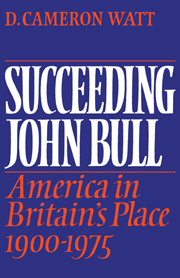Summary
The ‘special relationship’ really died with Kennedy, whose death was preceded by the enforced resignation of Harold Macmillan through ill-health. His successor, Sir Alec Douglas-Home, might have been able to salvage something of the relationship had he had longer in office. Indeed, his first visit to Washington in February 1964 seems to have gone extremely well, save for a controversy over British plans to raise the bank rate from 4% to 5%. Sir Alec's capacity for inspiring trust in those with whom he met went down well in Washington, as did his abandonment of his hereditary title, his directness of manner and the combination of apparent detachment from the grime and toil of everyday politics and acute political instincts, which was his hallmark. The main doubt he left behind him in the minds of an administration which was still virtually the same as that over which President Kennedy had presided was in the capacity of his Cabinet to manage the British economy, a doubt which was the more worrying in that America's own balance of payments was already less than entirely happy and the relations between pound sterling and dollar were too close for easy disassociation or detachment. The consequences of the disappearance from the scene of the ‘two pillars’ of the relationship were to be reaped in the full later in the autumn of 1964, with the coincidence of the general election in Britain and the presidential election in America.
- Type
- Chapter
- Information
- Succeeding John BullAmerica in Britain's Place 1900-1975, pp. 144 - 157Publisher: Cambridge University PressPrint publication year: 1984



